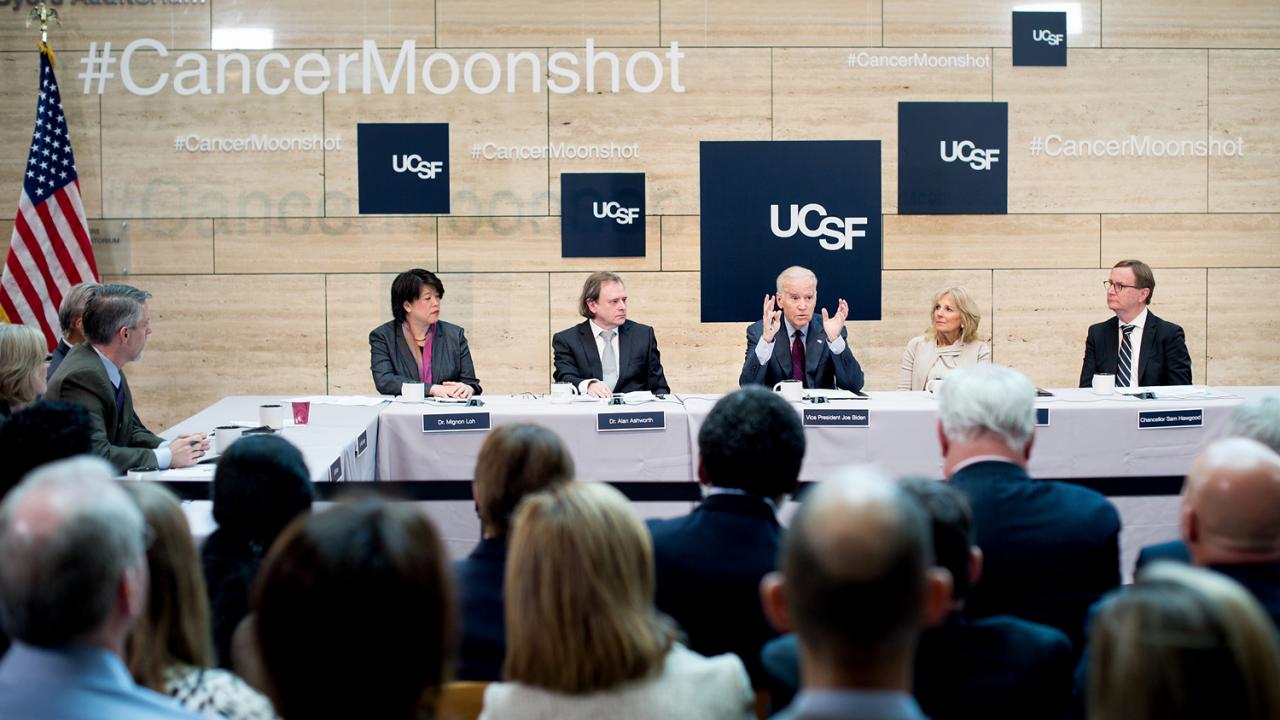
Vice President Joe Biden and his wife Jill Biden, PhD, visited UC San Francisco on Saturday, February 27, to discuss the administration’s national “Moonshot” initiative to improve cancer outcomes in the next decade.
Alan Ashworth, PhD, FRS, president of the Helen Diller Family Comprehensive Cancer Center and senior vice president for cancer services at UCSF Health, was pleased to host the Bidens and lead a panel of cancer experts that included UCSF Cancer Center researchers Mitchel Berger, MD, Mignon Loh, MD, and Christine Miaskowski, RN, PhD. The visit also included a lab tour and discussions with investigators Zev Gartner, PhD and Wendell Lim, PhD.
During the roundtable discussion, Dr. Ashworth emphasized the following areas of priority to help achieve the “Moonshot” in California:
Collaboration. Bringing together people with diverse expertise and experience will promote innovation in cancer research, providing new insights into the disease.
“The University of California cancer centers have already entered a discussion about much broader collaboration,” said Dr. Ashworth. “When you get the scale of those five cancer centers together, you can do things that, individually, we couldn’t possibly do.”
Taking risks. Embracing risk in cancer research will yield more innovative results.
“You do not get great rewards without taking risks, and we need to take more risks in the research we do,” said Dr. Ashworth. “It’s okay to fail -- that’s what people say in the Bay Area -- just don’t make a career out of it.”
To encourage researchers at UCSF to think big, the Cancer Center recently announced a $250,000 funding opportunity to support a high-risk, high-reward research project that would be unlikely to get funded through conventional mechanisms. Open to anyone at UCSF, the grant calls for “a wild idea to impact cancer."
Prevention. In addition to striving for a cure, prevention of cancer is essential to reduce the burden of this disease on future generations.
“Between a third and a half of cancers can be prevented with what we know now. Tobacco elimination remains a critically important goal here,” said Dr. Ashworth. “We also need to think about better screening, access to screening, and vaccination against viruses.”
The Cancer Center recently launched the UCSF Center for BRCA Research, a central resource for families with BRCA and other genetic mutations to receive education and care to prevent cancer, as well as the opportunity to participate in research to develop new prevention and screening guidelines, and new treatments for hereditary cancers.
Reducing cancer disparities. It is critical to put more effort and research into reducing the disparities in cancer incidence and outcome in underserved populations.
“We need to be conscious that cancer does not equally affect communities and different groups within our communities,” said Dr. Ashworth. "At UCSF we’ve got a big program that we’re going to launch on what we call 'precision population health’: dealing with different communities in different ways to reduce the burden of cancer.”
The UCSF Cancer Center also partners with the UCLA Fielding School of Public Health to run the Minority Training Program in Cancer Control Research, one of the nation's longest-running programs to encourage people of color to pursue PhDs in cancer disparities research.
 Read more about Vice President Biden's visit at UCSF.edu
Read more about Vice President Biden's visit at UCSF.edu